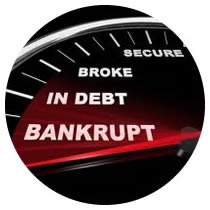BANKRUPTCY
Stop the Madness & Start Living Again
Debt Relief and Bankruptcy Advice in Kentucky
If you’re feeling financial pressure from any source – credit cards, hospital bills, collection agencies or tax problems – it might be time to discuss your options with a knowledgeable bankruptcy attorney. At Wantland Law in Shepherdsville, we can give you the advice you need and save you the trip to Louisville.
Contact us for a free consultation about your options if you face serious financial problems in Bullitt County, Jefferson County, Nelson County or Spencer County. You can benefit from dependable and resourceful legal advice in a welcoming small-town atmosphere.
Don’t make unwise choices – 401(k) loans, payday loans, check-advance loans, rapid relief loans and income anticipation loans – they go by many names, but they only make your financial problems worse. Let Wantland Law show you how bankruptcy may help relieve your debt problems.
Which is Better for Me - Chapter 7 or Chapter 13?
Once you’ve decided that bankruptcy makes sense for your situation, the next step is to decide which chapter of bankruptcy to file. While Chapter 7 offers the fastest route to a discharge, not every person or every situation is best suited for a Chapter 7. People who have a lot of assets to protect might be better off under Chapter 13 even if they’re eligible for Chapter 7 relief.
Call 502-957-0000 for a Free Consultation About Your Bankruptcy Options
Contact Scott Wantland at Wantland Law, PLLC in Shepherdsville for reliable advice about choosing between Chapter 7 and Chapter 13 bankruptcy. Scott has helped families throughout Bullitt County, Jefferson County and the Louisville area with all kinds of debt and collections problems over the past four decades, and he can help you through financial problems as well.
Chapter 7 Bankruptcy
For most people, Chapter 7 is the better option if you can meet the eligibility requirements. A Chapter 7 case usually takes no more than six months from beginning to end, and you get a complete discharge from most kinds of unsecured debt – which means that, in most cases, you’ll never have to pay it back.
Chapter 7 comes with a catch, though. Generally, your household income can’t exceed the Kentucky median income if you want to obtain a discharge of your debts. If your income is higher, you will have to pass a “means test” in order to file for Chapter 7 relief. The good news, however, is that our lawyers have a detailed understanding of the bankruptcy income adjustments that could help you qualify. Some of the people we represent are pleasantly surprised to find that they are eligible for Chapter 7 after all. Let our professional advice and experience guide you toward the best method of debt relief for you.
Chapter 13 Bankruptcy
Chapter 13 serves the debt relief needs of people in several situations. Typically, people file under Chapter 13 if their adjusted household income is too high to obtain a full discharge under Chapter 7. Many file under Chapter 13 because they own assets that would be subject to the claims of creditors in a Chapter 7 case or they want to use bankruptcy to get caught up on their mortgage or car loans.
Chapter 13 Requires You to Pay Back a Part of Your Unsecured Debts
A potential downside of Chapter 13 is that you still have to make payments. You will make payments to a bankruptcy trustee, generally for three to five years, who will then pay your creditors. Often times people end up paying just a nickel or dime on the dollar, but the exact amount you’ll need to pay depends on the total of your debts, the value of your nonexempt assets and your income.
Before you file Bankruptcy - Credit Counseling
Step 1 - Pre-Bankruptcy Counseling
Before you can actually file for bankruptcy, you must complete an approved credit-counseling session. This can be done by phone or over the Internet. No matter what advice you receive from the credit counselor, you still have the legal right to file for bankruptcy.
Step 2 - Debtor Education
After you file for bankruptcy you must complete financial education course from an approved provider list. The course provides information on how to create a financial budget.
Your bankruptcy will not be discharged until you complete the course.
Bankrupcty FAQ's
What is Bankruptcy?
Bankruptcy is a legal proceeding in which a person who cannot pay his or her bills can get a fresh financial start. The right to file for bankruptcy is provided by federal law, and all bankruptcy cases are handled in federal court.
Filing bankruptcy immediately stops all of your creditors from seeking to collect debts from you, at least until your debts are sorted out according to the law.
What Can Bankruptcy Do for Me?
Bankruptcy may make it possible to:
Eliminate the legal obligation to pay most or all of your debts. This is called a “discharge” of debts. It is designed to give you a fresh financial start.
Stop foreclosure on your house or manufactured home and allow you an opportunity to catch up on missed payments. (Bankruptcy does not, however, automatically eliminate mortgages and other liens on your property without payment.)
Prevent repossession of a car or other property, or force the creditor to return property even after it has been repossessed.
Stop wage garnishment, collection phone calls and other debt collection harassment.
Restore or prevent termination of utility service.
What Bankruptcy Cannot Do?
Bankruptcy cannot, however, cure every financial problem. It is not the right step for every individual. In bankruptcy, it is usually not possible to:
Eliminate certain rights of “secured” creditors. A creditor is “secured” if it has taken a mortgage or other lien on property as collateral for a loan. Common examples are care loans and home mortgages. You can force secured creditors to take payments over time in the bankruptcy process and bankruptcy can eliminate your obligation to pay any additional money on the debt if you decide to give back the property. But you generally cannot keep secured property unless you continue to pay the debt.
Discharge types of debts singled out by the bankruptcy law for special treatment, such as child support, alimony, student loans, court restitution orders, criminal fines, and most taxes.
Discharge debts that arise after bankruptcy has been filed.



